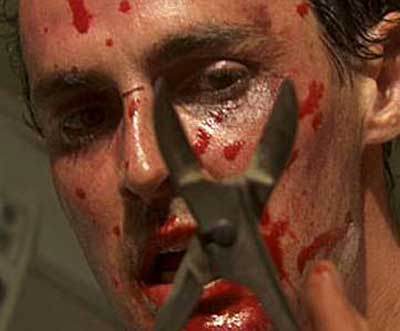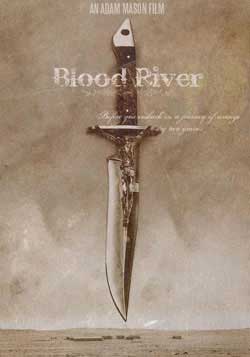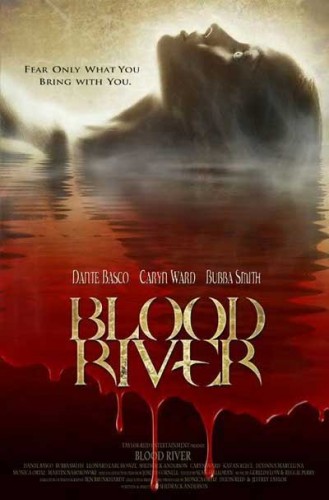SYNOPSIS:
A psychological thriller following a successful young married couple on their way to visit family. After a blowout on a desolate stretch of highway in Nevada, they head to the next town only to discover it long abandoned. Here they meet a mysterious stranger who seems to know decidedly more than he is sharing. In aiding their survival, he gradually undermines some of their most comfortable assumptions, playing wife off against husband. As they struggle to co-operate with this plain-speaking itinerant without compromising their own trusted partnership, his behavior becomes more bizarre and accusatory. Surface reality starts to fragment, dark secrets threaten to emerge, and their secure lives start to unravel…
REVIEW:
Directed By: Adam Mason
Written By: Adam Mason and Simon Boyes
Starring: Andrew Howard, Tess Panzer, Ian Duncan
Marriage life can be increasingly complicated with secrets from the past that test a couples’ trust in each other. Mix religious beliefs that harness repayment of sins, and the psychological stress can lead to a loss of sanity and ability to kill one another. This mix of psychological angst and religious stronghold is prevalent in Adam Mason’s Blood River.
Scenic shots of the desert and mountains lead into the story of young couple Clark(Ian Duncan) and Summer(Tess Panzer.) They are driving an older model red car, and see a man(Andrew Howard) in a black cowboy hat and black shirt. They pass the hitchhiker, not thinking much of it and stop at a hotel to rest. In the hotel room, Summer reveals that the couple are expecting their first child with bliss. While the couple is resting, the hitchhiker is shown torturing the hotel worker and proclaiming that he is the “lord’s messenger.” The hitchhiker uses his religious talk to convince the hotel worker that her life is full of sin, and the only way to relieve herself is to end it.
Summer and Clark resume their trek to Summer’s parent’s house, and some important back story elements come out through Clark’s fear of listening to his father-in-law complaining about Clark “manning-up” in the relationship. Summer is relaxed about the topic, and continues to be so until the car suddenly gets a flat tire and wrecks. Clark is covered in blood, and has difficulty getting around at first, while Summer worries about her baby without a mark on her. The car is stuck in the sand, and unfortunately the spare tire is gone. They get the map out of the car, and notice that the closest civilization is at Blood River. They take the five mile trek to the city, struggling to walk in the dry, hot weather.

When they reach Blood River, the town is a complete ghost town. The only things to find are dead animal bones and abandoned cars with no help or water in sight. When all else fails, the see the hitchhiker come walking down the road. Their prayers seem to be answered, when they rejoice in the hitchhiker’s presence. The hitchhiker introduces himself as Joseph, and offers the couple water and alcohol. Summer refuses alcohol, but Clark takes a swig as he watches Joseph check his wife’s stomach to see if the baby is ok. Joseph successfully charms Summer, and convinces the couple to spend the night by reassuring that he will assist them in repairing the car.
Clark’s insecurities are further revealed through telling Joseph outside that he didn’t appreciate him touching his wife. Clark also makes Joseph known that he doesn’t want Summer to know that their chances of getting out alive are very slim. Joseph immediately goes to Summer about the matter, and Summer is hurt that Clark so easily wants to hide things from her. At night, Summer reveals to Joseph that she has a son from an earlier relationship named Ben. Joseph sees the picture, and goes on about how he is anti-authority and does whatever he wants. Summer is incredibly impressed, while Clark’s non-acceptance of Joseph grows stronger.
The next morning, Joseph and Clark get ready for their trek to the car, and convince Summer that she should stay back in the ghost town. Joseph pulls out a gun, and knowingly touches Summer to teach her how to use the gun. This causes Clark’s jealousy to rise even more, and causes more of a disagreement when walking to the car. Joseph easily picks out Clark’s imperfections, and goes on with a long speech about how Clark is a slave to society. This drives Clark crazy emotionally, and he feels exhausted on their way. While they make their way to the car, Summer starts hearing things, especially a radio broadcasting spiritual words. This starts the innuendo of Clark’s big secret, as Joseph hounds Clark to tell him what he is hiding. Joseph disappears, and Clark is revealed to a huge predicament that can devastate Summer.
Joseph suddenly reappears to Summer, and he claims her child while preaching to her about all the sins that Clark and her hold. In a sudden adrenaline rush, Clark runs to the aide of Summer in an emotional sprint. Clark comes to Summer’s rescue, and tortures Joseph while Summer cries out in agony. Joseph finally agrees to take them to safety, but ends up teaching them a lesson in religious salvation for their seemingly perfect life.
Blood River is an emotional rollercoaster, as the characters suffer through starvation, heat, thirst, pain, and relationship imperfections. Andrew Howard plays the part of Joseph the Tim Mcgraw looking hitchhiker very well, and haunted the two main protagonists throughout the movie. Ian Duncan was very believable in his portrayal of a new father struggling to compensate for his imperfections and be a man for his wife. The only problem with Ian Duncan and Tess Panzer(Summer) was that they had an accent that struggled to come through in the deliverance of their lines. There was far less violence than dialogue throughout the movie, and could be a hassle for the viewer looking for lots of blood and violence to keep the flow of the movie at hand.
With beautiful scenic shots and strong emotional battles for sanity, Adam Mason’s Blood River is a mental trip through salvation from a life of sin. Even though we go through the motions of an everyday lifestyle, our deep down regrets can cause extreme angst that causes us to do things that are only a product of extreme anxiety and repentance of sins according to religious thought.
 Horror News | HNN Official Site | Horror Movies,Trailers, Reviews
Horror News | HNN Official Site | Horror Movies,Trailers, Reviews


Joanne Ross writes: “Adam Mason’s Blood River is a mental trip through salvation from a life of sin. Even though we go through the motions of an everyday lifestyle, our deep down regrets can cause extreme angst that causes us to do things that are only a product of extreme anxiety and repentance of sins according to religious thought.” That conclusion is not only odd but would be exactly the one that Joseph, the enigmatic serial killer of this movie, would ascribe to his own motives.
The conclusion is also misguided. Adam Mason’s film is not any kind of a profound psychological study of the human condition. There is no lesson in religious atonement for wickedness being taught here to the unfortunate travelers, Clark and Summer, who fall under the power of the enigmatic killer-zealot. The elephant in the closet – Clark’s supposed grave sin that he could not speak of to his wife, the murder of her son, his stepson, and her supposed culpability in this by failing to see the wickedness in his nature, as all of this melodrama unfolded in the dramatic closing stages – had zero plausibility as a plot twist. Hence this was no morality tale, in which the divide between virtue and sin was reversed, so that the conventional middle-class couple were made to face and pay the price of salvation. Clark could not possibly have killed his stepson. Nor was there any reason to suppose he harbored any covert wish to do so that Joseph, the self-appointed avenging angel, could exploit to sow the doubts in his (or his wife’s) mind. To read all of this into this movie is tilting at windmills or clutching at straws.
Yet this is not to say this is a film without purpose and power and narrative intelligence. It is all of these things. The acting is first rate. The atmospherics and scenic scope of it are impressive. The message here, as far as I can tell, is the fragility of reason and sanity faced with desperate situations and psychological warfare waged in the service of evil. If understood as such, the plot holes disappear.
Whatever God Joseph serves, this is not one of love or forgiveness. Nor is his a God of love. Like the voices that speak to any mission-oriented sex killer, the ones that speak to Joseph demand only that he walks the earth in order to murder and torture. Only, as it transpires, Joseph’s modus operandus is to manipulate the vulnerable and susceptible into torturing and killing themselves or their loved ones by convincing them that they are not worthy of life. He is a wrecking ball of love and identity.
He starts the film by causing a lonely hotel receptionist to cut herself to death, bit by bit, with a razor. He either murders Summer’s five-year old son and transports his decomposing corpse into the trunk of Clark’s abandoned car or causes Clark to hallucinate that the child’s body is in his car. He manipulates Summer and Clark into a confrontation by exploiting her love for her son whom he hints has been harmed by Clark, leading her to shoot her husband dead. She is then left to die in the desert heat along with her unborn child, as Joseph makes contact with his next victim – a middle-aged woman charitable enough to offer him a ride.
Hence a dark parable of the subtleties and machinations of evil, to be sure. There is nothing God-fearing or humble about Joseph as he goes about his grisly work. Nor is there a sense that for him this terrible work, which is not, he claims, his own but God’s, is experienced as a heavy burden. Not a bit of it. Joseph is very much “modernity’s man”, animated by self-entitlement and self-deification. I’m free in my own mind, he declares at one point, living by my own rules, doing as I see fit – which is an attitude more in keeping with the amoral corporate boss than an itinerant preacher of the Word. There is nothing ambivalent about Joseph.
It is the other leading characters who are ambivalent, manifesting under pressure fears, anxieties, phobias and imperfections. Hence, Summer is seduced by Joseph’s easy charms, falling into an almost trance-like state of trustfulness, finding nothing of concern in his strident rejection of all earthly order and and authority and his self-aggrandising behaviour. Summer even allows Joseph to redirect a firearm she is holding into pointing at her husband as Joseph simulates pulling the trigger. She manifests as a weak, dependent, manipulable creature. Meanwhile, Clark is provoked by Joseph into exposing his petty middle-class prejudices and phobias over the supposedly workshy or free-spirited. As the pressure builds, again provoked by Joseph, Clark manifests an jealous possessiveness over his wife, threatening Joseph for touching her. Towards the end, as the self-survival instinct kicks in, Clark is reduced to torturing Joseph, despite the distress this causes in Summer, in an attempt to force him into providing them with an escape route from the desert trap that is threatening his life and that of his wife and child.
This is a parable also about how in the pinch of existential crisis the better side our characters may become subordinated to the insecure, suspicious, frightened animals who dwell within. Yet it is the psychological warfare waged by Joseph (a demon or devil, no less, in human form) on people that he has placed in intolerably hellish conditions that allows these phobias to bloom and mutate into self-destruction of love, trust, hope and ultimately life. Summer and Clark are merely human, warts and all.
This is not one to miss! Nor is it one to enjoy – since the weakness of human nature is shown here to stand no chance of holding true to its nobler characteristics faced with the forces of random evil.